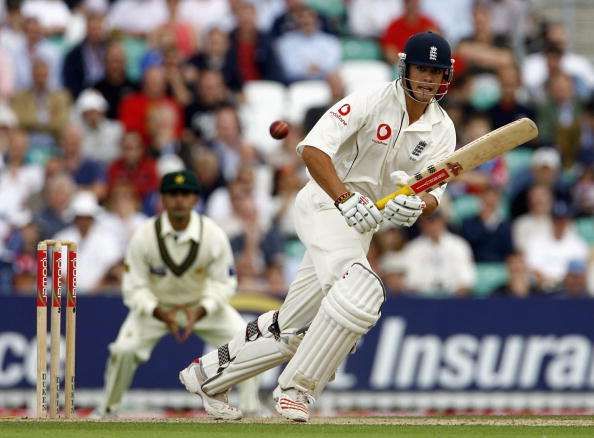
Alastair Cook: England’s rock at the top of the order

Ten years ago, when former England opener Marcus Trescothick suffered from stress issues, the young left-hander who would replace him would be subjected immediately to the spinning tracks and the intense heat of India. A year earlier, in 2005, former Hampshire captain Mark Nicholas had observed this lithe lad play at Lord’s in a county fixture about whom, as Nicholas puts in a recent article, “good judges were saying happy things”.
He enquired from England great Graham Gooch about this technically sound Essex opener. “He told me that this lad would make a mountain of runs in Test match cricket, which is an un-Gooch-like remark,” Nicholas further states.
A debut – and time – to remember
Showing little signs of batting in alien conditions, Alastair Cook planted 60 in his debut international innings in Nagpur before grinding out an unbeaten 104 in the second. He returned home with 183 runs against his name at an average of 61 after participating in two Tests.
The tone was set and the seeds sown for a successful England career to come. This was the beginning, he showed. He deserved to be there, he proved. He had the skill to survive in an unfriendly ambience, he suggested.
And when Trescothick returned to play Sri Lanka two months later, Cook was demoted to three but remained indifferent. He struck 89 while centuries at Lord’s and Old Trafford followed – which included his first home hundred – in the subsequent series against Pakistan.
Cook was on his way to an early special time amidst the high expectations of international cricket and a timely call by the selectors to join Andrew Strauss at the top was proving to be a reliable verdict.
Ton on Ashes debut

His pull spoke of panache, his cut brewed with confidence and his drive contained elements of mastery. England learnt that Trescothick would overlook another foreign assignment, so Cook was back partnering Strauss. That meant while his days as England opener still remained raw, Cook toured Australia, and faced men starving for revenge for the 2005 Ashes defeat.
There was the strong, tight Glenn McGrath, the vicious pace of Brett Lee and the magical Shane Warne whom he would encounter on his first tour Down Under for the 2006-07 Ashes series.
Initially, Cook found life difficult in the fiery pace and bounce of Australia, but while England chased a mammoth 557 in Perth, he sprung to life with a calmly carved 116 as they folded for a fighting 350 – a first Ashes ton.
Reverence for this technically sound top order bat was rising with repeated innings of repute on rival soil. Two tours, two hundreds; two home series, one hundred. And two more came – against the West Indies next summer – again at Lord’s and Old Trafford. Cook played swing and encountered pace with the same guile.
On the Sri Lanka tour in 2007, he contributed 81 and 62 in the second Test, while the real addition was the laborious 118 in the sweltering Galle heat in the third game, batting for more than six hours to aid England in a draw.
Tough times, but Cook becomes a senior
Then came the scratchy patch. Stretching over eleven months from March 2008 to February 2009, he breached fifty ten times over 15 Tests but failed to convert promising starts into the expected big hundreds. His new captain Strauss – now appointed officially – and the coach Andy Flower, however, saw in Cook the skill to deputise the former in the West Indies in January 2009. The ascending Cook was now a vice-captain.
Another missed opportunity to get to triple figures annoyed his fans as Cook fell for 94 in Barbados, but made up for it by finally getting rid of the fever – his Test-best 139 followed in the second outing. That led him to 3,000 Test runs – the youngest English cricketer to the landmark at 24 years and 67 days old.
His glory had just begun. An England career began to sore. Cook was emerging as a dependable student of the game. And not far away awaited his first “daddy” hundred – as his friend and guide Gooch puts it – which came also against the West Indies in May 2009: a patient 160. And months later, a first Ashes win came Cook’s way – at home in 2009.
Like three of his first visits earned hundreds, it was no different in South Africa. In Durban, his 118 took England to victory. And Bangladesh was next. Touring as captain – he stood-in for the rested Strauss – Cook’s consistency fetched him successive centuries as scores of 173 and 109* added feathers to his cap. Cook was continuing to be a class apart.
The difficult phase, again and the Gabba boss
But back home to play Bangladesh and Pakistan, his concerns returned to haunt him as a highest of 29 across eight innings produced rumours of his absence from the squad to fly to Australia for the 2010-11 Ashes. The stable Cook fought valiantly and safety was guaranteed when he contributed 110 against Pakistan at The Oval.
That took him to Australia for the second time and he returned home with runs worth gold. His maiden – and epic – double ton lasted over ten hours for an unbeaten 235 at the Gabba, assisting his team to a draw. Cook personified concentration, his agility between the wickets a shot in the arm for England.
Back to the party

Then came 148 in Adelaide and 189 in Sydney – a total of 766 at an average of 127.67 on the arch-rival territory – and Cook left Australian shores recording the best figures by an Englishman there, since Wally Hammond in 1928-29.
The rising Cook was then rewarded with captaincy following Strauss’ retirement from ODIs. That only protracted his Test form and twin tons against Sri Lanka at home preceded a historical 294 against India at Edgbaston in 2011. The most by an England batsman since Gooch’s 333 in 1990 ended in disappointment when Cook was caught at the point fence.
Maybe the triple hundred remains the only boundary that Cook is yet to cross.
A year later, Strauss quit Tests too and naturally, Cook succeeded his fellow left-handed opener. He was now captain of ODIs as well as Tests. And his very first assignment as officially in charge of the England side was a tour – like Strauss – when he took his team to India in November 2012.
As England followed on in the first Test at Ahmedabad, Cook led the way with 176. His habit of multiple centuries on tours continued as Cook slammed 122 in Mumbai and further upped the ante in Kolkata. A captain’s knock of 190 gave England a come-from-behind 2-1 lead, which eventually remained.
And more success came. On the way, Cook got to 7,000 as the youngest – eclipsing Sachin Tendulkar – and, with 23 in his bag, had the maximum hundreds as an England batsman. With two tons earlier as captain in Bangladesh, he achieved the distinction of being the only captain with hundreds in his first five Tests as skipper, which remains unmatched.
England won on Indian soil after 28 years. His very first series as permanent captain gave Cook a push. Officially England skipper twice to the subcontinent, the leader only grew further and became more mature with time.
An Ashes win – at home in 2013 – was his first as captain. But the tide took a turn when England were shamed 5-0 on returning to Australia during the winter that year and the Kevin Pietersen saga followed.